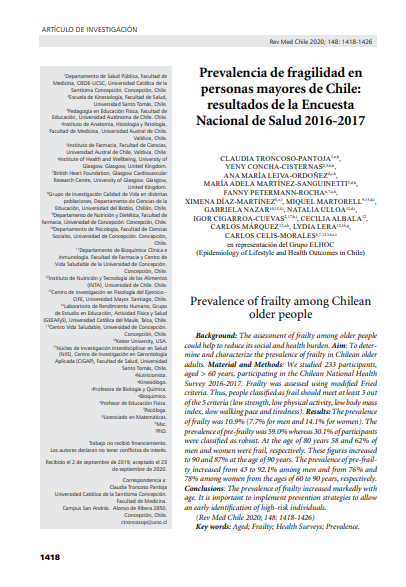Prevalencia de fragilidad en personas mayores de Chile: resultados de la Encuesta Nacional de Salud 2016-2017

Fecha
2020-10Autor
Troncoso-Pantoja, Claudia
Concha-Cisternas, Yeny
Leiva-Ordoñez, Ana María
Martínez-Sanguinetti, María Adela
Petermann-Rocha, Fanny
Díaz-Martínez, Ximena
Martorell, Miquel
Nazar, Gabriela
Ulloa, Natalia
Cigarroa-Cuevas, Igor
Albala, Cecilia
Márquez, Carlos
Celis-Morales, Carlos [Univ Mayor, Ctr Invest Fisiol Ejercicio CIFE, Chile]
Ubicación geográfica
Notas
HERRAMIENTAS
Acceda a títulos restringidos
¿Cómo descargar?Resumen
Background: The assessment of frailty among older people could help to reduce its social and health burden. Aim: To determine and characterize the prevalence of frailty in Chilean older adults. Material and Methods: We studied 233 participants, aged > 60 years, participating in the Chilean National Health Survey 2016-2017. Frailty was assessed using modified Fried criteria. Thus, people classified as frail should meet at least 3 out of the 5 criteria (low strength, low physical activity, low body mass index, slow walking pace and tiredness). Results: The prevalence of frailty was 10.9% (7.7% for men and 14.1% for women). The prevalence of pre-frailty was 59.0% whereas 30.1% of participants were classified as robust. At the age of 80 years 58 and 62% of men and women were frail, respectively. These figures increased to 90 and 87% at the age of 90 years. The prevalence of pre-frailty increased from 43 to 92.1% among men and from 76% and 78% among women from the ages of 60 to 90 years, respectively. Conclusions: The prevalence of frailty increased markedly with age. It is important to implement prevention strategies to allow an early identification of high-risk individuals.
URI
https://repositorio.umayor.cl/xmlui/handle/sibum/9283https://www.scielo.cl/pdf/rmc/v148n10/0717-6163-rmc-148-10-1418.pdf
http://dx.doi.org/10.4067/S0034-98872020001001418
Coleccion/es a la/s que pertenece:
Si usted es autor(a) de este documento y NO desea que su publicación tenga acceso público en este repositorio, por favor complete el formulario aquí.